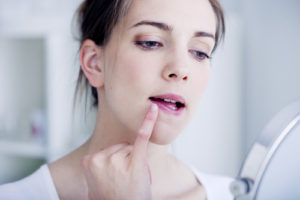Dry Mouth: What You Need to Know

Millions of Americans suffer from dry mouth, a condition called xerostomia. Having a dry mouth can have disastrous effects on your teeth and gums.
Dry mouth is becoming more and more common, especially among older patients who take multiple prescription medications. Unfortunately, many people are completely unaware that their mouths are too dry.
How to Tell if You Have Dry Mouth
Many of our patients do not realize that their mouths are dry. As dentists, we know exactly what a healthy amount of saliva looks and feels like, so we notice when your mouth is more dry than normal.
One quick way to find out if you have dry mouth is to come by for a dental evaluation. We can tell relatively quickly whether you have the proper quality and quantity of saliva.
Ask yourself the following questions, and if you answer “yes” to any of them, call to schedule a consultation with Dr. Ann and Dr. Lauren.
- Do you wake up with your lips, cheeks, or tongue stuck to your teeth?
- Do you need to take a drink of water to help you swallow your food?
- Do you suffer from consistent bad breath?
- Do you take more than one prescription medication?
- Do you frequently get new cavities even thought you practice great oral hygiene?
What Causes Dry Mouth?
There are many different causes of dry mouth. They can be divided into two categories: 1) External factors with normal saliva production 2) Factors that reduce saliva production.
Normal Saliva but Outside Circumstances
If a person is able to produce a normal amount of saliva, but some external factors dry the mouth, the result is a dry mouth. This includes mouth breathing, which is usually caused by chronic nasal obstruction. Mouth breathing is also the result of an improper jaw relationship that prevents someone from closing their lips completely.
Another external factor that can cause a dry mouth is inhaled medications. Many patients with chronic asthma or cystic fibrosis have to perform inhaled breathing treatments at least once daily, often more than once a day. The airflow of these treatments has a drying effect on all the tissues of the mouth, and the more commonly they occur, the drier the mouth.
Causes of Saliva Reduction
By far, the most common cause is prescription medications. Almost every single medication prescribed today has “dry mouth” as a side effect. That effect is compounded when you take multiple medications. For example, someone taking an antidepressant, blood pressure pill, and allergy medication could suffer from extreme dry mouth as all three of these classes of drugs cause dry mouth.
Another external factor is malfunction of the salivary glands. This can result from autoimmune disease or cancer treatment involving radiation therapy to the head and/or neck. There are some autoimmune disease in which the body attacks the salivary glands, affecting their ability to produce saliva. In cases of radiation, the radiation itself kills salivary gland cells, thus disabling them from doing their job.
How Does Dry Mouth Harm Teeth and Gums?
Saliva is our body’s natural defense against bad bacteria in the mouth.. It contains proteins and enzymes that directly counteract the bacteria, and its basic pH neutralizes the acid those bacteria produce. Saliva functions to constantly flush away bacterial buildup from the smooth surfaces of the teeth.
When saliva is NOT present in normal levels, you begin to lose the fight against oral bacteria. In the absence of saliva’s defense, the bacteria flourish and take over. Patients with dry mouth start accumulating plaque in areas that saliva would normally wash away.
When you have a dry mouth, even the very best oral hygiene at home will not prevent dental disease. Patients with dry mouth require more aggressive intervention to prevent cavities and gum disease. That’s where we come in!
What Can You Do about Dry Mouth?
There are a few steps you can take to fight the increased risk for dental disease that is inherent with a dry mouth. Unfortunately, a dry mouth forces you to up your oral hygiene game. Here are the things that are essential to winning the fight against dry mouth.
- Never miss a cleaning! The insight gained from your professional teeth cleaning and dental evaluation is invaluable. Ann, Dr. Lauren, Phyllis and Nancy are experts in the fight against dry mouth and can give you information and instructions unique to your particular needs.
- Commit to great oral hygiene! This means you cannot ever slack off with your brushing and flossing. The fact that bacteria can more easily form buildup on your teeth in a dry mouth means you have to be diligent and consistent in removing that buildup.
- Use additional recommended hygiene products. The exact products you should use will be part of your specific instructions from Dr. Ann, Dr. Lauren, Phyllis and Nancy. Some people will use over-the-counter products, and others need prescription strength. These can include a fluoride product to strengthen enamel and make it more resistant to cavities or products aimed at moisturizing your mouth.
- Drink plenty of water! Make sure to stay hydrated in order to give your body its best chance at producing saliva. The water can also function to flush away some plaque and bacterial debris from the teeth in the absence of saliva.
- Chew sugar-free gum in between meals! The flavor and action of chewing gum stimulates the production of saliva. If possible, choose a strong peppermint flavor or something sour, which spurs your salivary glands to make lots of good saliva. Using sugar-free mints may also help a little, but the chewing action stimulates more saliva, so gum is better!
- Make sure to let your dentist know when you notice any changes in your mouth. A dry mouth allows dental problems to move more quickly than normal. Cavities get bigger, faster. Gum pockets get deeper, faster. Ann and Dr. Lauren need to keep a closer eye on you if you have a dry mouth.
Do You Have a Dry Mouth?
If so, call today to schedule a consultation with Dr. Ann, Dr. Lauren, Phyllis or Nancy. We can help you prevent the problems caused by dry mouth!
